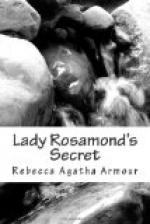Most illustrious Vice-Chancellor, and you, learned Doctors,
I present to you a distinguished man, adorned with many virtues and honors, belonging to military and civil affairs, as well as to literature—Howard, a Knight and Baronet, a worthy heir of the latter order from a renowned father, the former richly deserved from his own king and that of Spain; a member of the Royal Society of London, on account of the fame of his writings; for many years the Governor of New Brunswick, followed by the admiration and favor of his country and the reverence and love of the Province; lastly, Chancellor of a College in that Province, built under his care and direction, to which its patron, the king, gave his name and a University’s privileges. Behold the man! I now present him to you that he may be admitted to the degree of a Doctor of Civil Laws for the sake of honor.
Further comment upon the above is unnecessary, it being sufficient to convince one of the degree of popularity which Sir Howard had attained.
The next place in which he plays a most conspicuous part is in the presence of royalty at the Dutch court, where he was received with all the honors his rank, position and claim demanded. His Majesty entered in a lengthy and earnest conversation regarding the important question now to be settled by his decision. Sir Howard stated clearly every circumstance in connection with the affair from beginning to end. To every question he gave a prompt reply, showing the clearness of judgment by which every argument had been maintained. In order to explain why such a question should be brought up forty-seven years after the treaty had been signed, he showed that it was founded on some indefinite or ambiguous clauses of the treaty of 1783, but not proposed until 1820. Here was a delicate point for His Majesty to settle without giving offence to either English or Americans. But Sir Howard was resolved to support the claim which contended for the rights of his nation—for justice and for truth. He was not desiring territory, but protection and security to the interests of his people, security to prevent the Americans from claiming the privileges of the St. John river or classifying the Bay of Fundy rivers with those emptying into the Atlantic. However, a decision at length was given which did not meet the wishes of either party, but the matter was set partially at rest.




